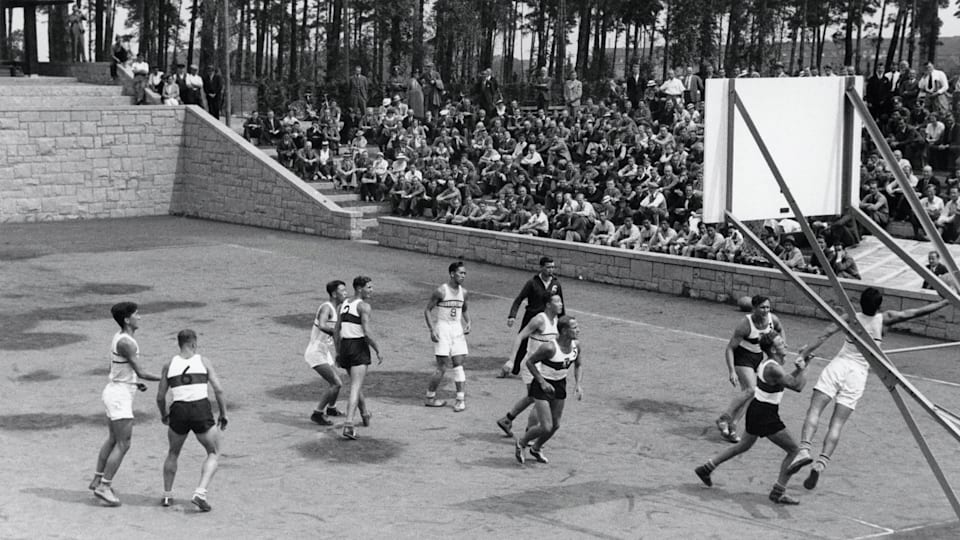
Basketball was invented in 1891 by James Naismith, a PE teacher at Springfield College, Massachusetts (USA). Asked to come up with an indoor pastime to keep his rowdy students occupied, Naismith devised 13 rules for his new sport, which soon spread across North America and eventually around the world.
It made its first appearance on the Olympic programme as a demonstration sport at St Louis 1904, though it was not until Berlin 1936 that it was granted the official status that it has enjoyed ever since.
According to the official report of the Games of the XI Olympiad, the decision to host the inaugural Olympic tournament outdoors was made by the International Basketball Federation (FIBA), which had been founded four years earlier.
The Organising Committee chose the Tennis Stadium as the venue for the competition, with its clay courts being reinforced to withstand the additional wear and tear. For reasons that soon became obvious, it was the first and last time that the Olympic basketball tournament was staged outdoors.
Exposed to the elements
The USA basketball team in Berlin was captained by Bill Wheatley. Almost half a century later, he was asked to share his memories of that inaugural competition by the Los Angeles Organising Committee for the Olympic Games 1984. “The ball was a lot bigger and heavier than the ones they have today, and there was a slit on one side where you put in the bladder,” he recalled. “No matter how tight you laced up that opening with rawhide, there was no way to make that ball perfectly round.”
The ball was a lot bigger and heavier than the ones they have today, and there was a slit on one side where you put in the bladder. No matter how tight you laced up that opening with rawhide, there was no way to make that ball perfectly round. Bill WheatleyUSA - Bill WheatleyUSA
“That, plus the dirt court, made it almost impossible to dribble, even when the ground was dry. Mostly we passed the ball up court anyway and, except for layups, we shot everything two-handed, which was what everybody did in those days.”
Muddy feet
James Naismith, who was by that stage 74 years old, travelled to Berlin with the USA team and was given the honour of throwing the jump ball at the opening match between France and Estonia, which ended in a 34-29 win for the Estonians. The sport’s founder also presented the medals at the end of the competition, in which a total of 22 teams took part.
The Americans reached the final courtesy of Spain’s last-minute withdrawal in the first round and subsequent victories over Estonia, the Philippines and Mexico, all of which were achieved by comfortable margins.
Their opponents in the gold-medal match were Canada, who had lost to Brazil in the first round but were then awarded a walkover win against Hungary and a return to the main competition round, where they went on to defeat Latvia, Switzerland, Uruguay and Poland.
We played two 20-minute halves in front of 500 umbrellas that I think had people under them. Bill WheatleyUSA - Bill WheatleyUSA
By modern standards, the tournament saw some very low scores, including the USA’s 25-10 defeat of Mexico in the semis and a 42-15 victory for Canada against Poland. And the gold-medal match between the two North American neighbours saw even fewer points scored.
“It rained hard for 24 hours before the final, and when the weather didn’t change the next day, we figured the Germans would surely postpone things,” recalled Wheatley. “By now that dirt court was so muddy and slippery that nobody could run much or dribble a ball on it! But the Germans just wanted to get it over with, so we played two 20-minute halves in front of 500 umbrellas that I think had people under them!”
Conditions were so bad that one journalist covering the game was prompted to write that it was “almost like watching a water polo game”.
After building up a 15-4 half-time lead, the US team concentrated on protecting the ball in the second, making sure their opponents could not mount a comeback. The rain intensified after the restart, with only eight more points being added as the USA won by a record low score of 19-8 to collect the first Olympic basketball title.
The US men’s team has since added a further 14 basketball golds, the latest of them coming at Rio 2016. Along the way, they have lit up the sport, never more so than at Barcelona 1992, when the “Dream Team” broke the 100-point barrier in each of its matches. And their epic final victories over Spain at Beijing 2008 (118-107) and London 2012 (107-100) are among the other stand-out moments in Olympic basketball history.
For those who saw it, however, that maiden gold medal, secured in such unique circumstances, would remain an enduring memory.
